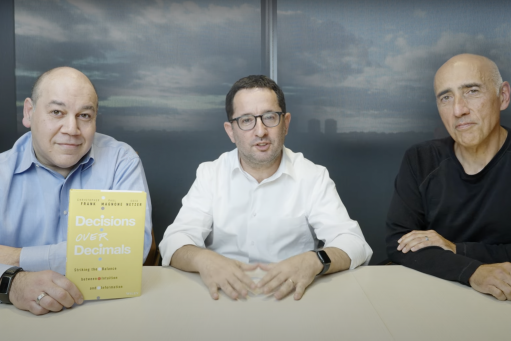5 Questions About Real Estate and Finance With Professor Stijn Van Nieuwerburgh
Columbia Business School’s Earle W. Kazis and Benjamin Schore Professor of Real Estate Stijn Van Nieuwerburgh discusses the growing use of data in real estate and the school’s latest curricular innovations.
Stijn Van Nieuwerburgh, the Earle W. Kazis and Benjamin Schore Professor of Real Estate at Columbia Business School, recently joined us to discuss his research, teaching real estate finance and real estate analytics, and the real estate curriculum at CBS.
Q: How and why did you start researching and teaching real estate finance?
Stijn Van Nieuwerburgh: I was trained as a macroeconomist with a strong interest in finance and in real estate. When I was looking for a dissertation topic back in the year 2000, this was the middle of the dot-com boom, one thing I noticed is that real estate as an asset class performed particularly well in that recession.
The magazine The Economist even ran an article at the time called “The Houses That Saved the World,” and so I started thinking about the extent to which housing can act as a source of value and a source of collateral for households and businesses, helping them to buffer a negative income shock. If you have a house and you lose your job, you could potentially borrow against your house to help you through that period of low income.
That's what became the topic of my dissertation, and ever since I’ve been very interested in this nexus of macroeconomics, finance, and real estate.
Q: How does Columbia teach real estate?
Stijn Van Nieuwerburgh: At CBS, our real estate curriculum is both deep and broad.
It all starts with this course that I teach alongside many of my colleagues called Real Estate Finance, which is a basic course that starts from the building – and trying to understand what are the cash flows that this building generates through leases. How do we value this stream of leases with the help of a performer analysis, and then think about how we finance these assets with a mix of debt and equity and potentially quite a rich capital structure, and use that to think about the different sources of capital in real estate.
That course is the jumping off point to a large suite of about a dozen courses in real estate that we offer at CBS, ranging from real estate debt to real estate equity markets, to international real estate, to PropTech, to real estate entrepreneurship, a course that I started to teach this past year called Real Estate Analytics, which is a big data meets real estate course.
We have a range of courses that allow students to specialize in what they're most passionate about – and help them to tailor their careers towards be it more of a role in real estate private equity or more of a role in real estate investment banking or real estate consulting.
Q: Tell us more about the Real Estate Analytics course.
Stijn Van Nieuwerburgh: The new course that I teach, Real Estate Analytics, brings big data together with business analytics tools to make progress on important questions in real estate.
In the class, we are studying questions of how did the pandemic affect real estate values – and urban versus suburban locations, residential versus office markets. We think about how to value publicly listed REITs and how to trade in them. We think about how to predict the refinancing behavior of households on their mortgages, the default behavior of mortgages.
In a lot of these questions, we're in an environment where there's a lot of data. For example the individual mortgage data, we literally have hundreds of millions of mortgages in the U.S. issued over several decades – and for each of these mortgages we could see whether they're refinanced, whether they defaulted in each month.
This is a very data-rich environment, and we want to bring those types of problems to the students and give them the tools to help answer these questions.
A lot of the course is done in Python. There's about 10,000 lines of Python coding in my class, so it's really kind of a confluence of conceptual questions in real estate with large data sets, with data analytics tools like Python coding, to help them analyze these questions.
Real estate has traditionally been very data poor. We’ve been operating in a very data-poor environment. But this is changing rapidly and modern business leaders are seeing the value from data and seeing how it improves their decisions. And very quickly the world is moving in this direction.
With this course I hope to help train that next generation of real estate leaders that think about how to make better decisions with more data and more analysis.
Q: How does learning about analytics prepare students for the real world?
Stijn Van Nieuwerburgh: To convince the students that this is not just conceptual, I brought in guest speakers and had a wonderful team from Welltower that gave us a very concrete discussion of how big data affects their day-to-day businesses in terms of their location, choice of their medical offices, in terms of where they built the next senior housing.
It was really an eye-opening experience for students to see that all these concepts that we had been talking about throughout the semester were already being put in action.
Q: What career options are there for students interested in real estate?
Stijn Van Nieuwerburgh: Real estate private equity is one of those important growth areas. The real estate private equity industry has raised a lot of assets over the last five years, and that has created a lot of opportunity for our students, and an increasing number of our students are finding their way into that area.
There's a lot of interest in startups and entrepreneurial activity. There's this whole realm of PropTech that a lot of our students are also increasingly finding their way towards – startups that focus on automating the real estate business, a lot of different parts of the real estate business.
Finally, there are traditional areas that are still strong – like real estate investment banking, real estate consulting – that a number of our students find their way in as well.
Like many other areas, there's a real scarcity of talent. The labor market is very good right now for our students, so all of our real estate students are gainfully employed.
More Webinars

Why Value Investing is Making a Comeback
Professor Tano Santos, the Faculty Director of Value Investing and Advanced Value Investing programs at Columbia Business School, outlines the reasons why value investing is returning to a period of ascendancy.

What Will Drive the Global Markets in 2023?
Columbia Business School Professor Abby Joseph Cohen recently joined former Dean Glenn Hubbard to discuss the forces that could shape the economy and markets in the year ahead.

How Can Leaders Use Data to Make Better Decisions?
Columbia Business School Professors Oded Netzer, Christopher Frank and Paul Magnone discuss their new book, Decisions Over Decimals, which offers a roadmap for effective decision-making when using data.

5 Questions About Value Investing and Finance
Professor Tano Santos, the Faculty Director of Value Investing and Advanced Value Investing programs at Columbia Business School, discusses the school’s approach to teaching value investing and finance.
Rise to the challenge.
The COVID-19 pandemic has changed the world of business, while bringing historical inequities and injustice into sharp relief.
Subscribe to Leading Through Change to receive the latest insights from Columbia Business School to help you navigate this unprecedented time.
